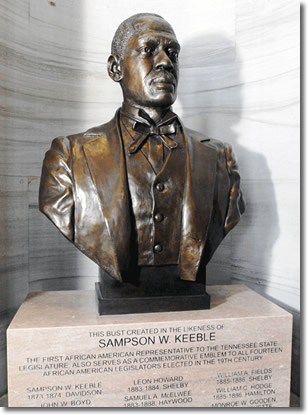Sampson Wesley Keeble (1833-1887)
by Linda T. Wynn, Tennessee Historical Commission and Fisk University

Nashville barber, businessperson, and politician Sampson Wesley Keeble was the first African American elected to the Tennessee General Assembly. Born in Rutherford County, Keeble and his family were owned by Walter Keeble, whose 1844 will instructed his heirs to educate and free his enslaved individuals when the law allowed. The eleven-year-old Sampson Keeble was among those inherited by Walter’s son, Horace Pinkney Keeble, a Rutherford County attorney. In 1851 Keeble went to work as a “roller boy” at the Rutherford Telegraph in Murfreesboro, becoming a press operator for both the Telegraph and the Murfreesboro News three years later.
Keeble moved to Nashville and supported himself by performing odd jobs, including working as a custodian in a law office where he took an interest in studying law, and working as a barber. Keeble’s journey turned triumphant as Tennessee, which was the third state to ratify the Fourteenth Amendment (granting citizenship status to African Americans), returned to the Union in 1866 with far fewer restrictions on its political structure than other former Confederate states. He was an active participant in the second State Colored Men’s Convention, which met in Nashville in August 1866, lobbying legislators to approve their right to vote. In March 1867, Tennessee’s General Assembly approved the right of African American men to vote and to hold political office, almost three years before the U. S. Congress passed the Fifteenth Amendment.
Keeble was a successful businessman whose Rock City Barber Shop was listed in city directories as late as the 1880s. The legal training he had received from working at the law practice ultimately allowed him to pass the Tennessee Bar and qualify for election as a Davidson County magistrate. During Reconstruction, Keeble emerged as a community leader, serving as a member of the advisory board of the Freedmen's Savings and Trust Company Bank and as a director of the Colored Agricultural and Mechanical Association. He joined other local blacks in the Davidson County Republican Party, won the Republican nomination for a seat in the House of Representatives, and was elected in November 1872 as the state’s first African American to serve in the General Assembly. He served on the House Military Affairs Committee and the Immigration Committee. By the time his term ended in 1875, Keeble had introduced three progressive but ultimately unsuccessful bills: to amend Nashville's charter to allow blacks to operate businesses in the downtown area; to protect Negro laborers and their wages; and to gain state funds for the Tennessee Manual Labor University. After his legislative service, he was elected a magistrate in the Davidson County Court, serving from 1877 to 1882. His service to the state of Tennessee has been commemorated with a historical marker and bust located outside the House Chamber in the State Capitol.
Sources:
Joseph H. Cartwright, The Triumph of Jim Crow: Tennessee Race Relations in the 1880s (Knoxville: University of Tennessee Press, 1976).
Bobby L. Lovett, The African-American History of Nashville, Tennessee, 1780-1930: Elites and Dilemmas (Fayetteville: University of Arkansas Press, 1999).
Robert M. McBride and Dan M. Robinson, Biographical Directory, Tennessee General Assembly, Volume II:1861-1901 (Nashville: Tennessee State Library and Archives, and Tennessee Historical Commission, 1979).
“Representative Keeble,” Nashville Union and American, 6 December 1872.
“Death of Sampson W. Keeble,” Nashville Daily American, 3 July 1887.
This Honorable Body: African American Legislators in 19th Century Tennessee http://www.tn.gov/tsla/exhibits/aale/keeble.htm.
Linda T. Wynn, “Sampson W. Keeble,” in Tennessee Encyclopedia of History and Culture, Carroll Van West, ed. (Tennessee Historical Society, Nashville: Rutledge Hill Press, 2002).
Suggested Citation
Wynn, Linda T. "Sampson Wesley Keeble (1833-1887)." Trials and Triumphs: Tennesseans' Search for Citizenship, Community, and Opportunity. Middle Tennessee State University, 2014. Web.